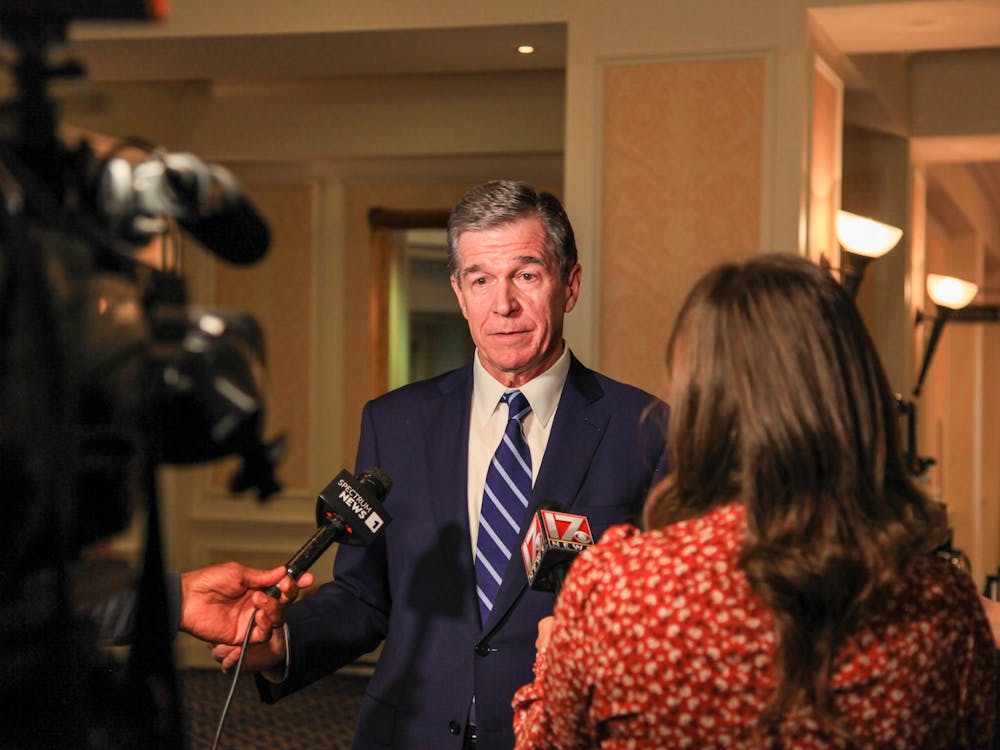Following President Joe Biden’s Sunday exit from the presidential race and swift endorsement of Vice President Kamala Harris, talks began about options for her running mate. North Carolina Gov. Roy Cooper has since emerged as a strong contender for the title.
USA Today reported Tuesday that Cooper, along with at least six other Democrats, had been contacted by the Harris campaign and asked to provide vetting materials.
A major pull factor for the outgoing governor is his history of electoral success in a politically diverse state.
The Harris campaign predicts North Carolina to be a highly contested battleground state. Harris herself has paid a total of seven visits to the state just this year, signaling a focus on securing North Carolina’s 16 electoral college votes. North Carolina is tied with Georgia for the eighth most electoral votes in the country, making the state particularly important given the electoral college’s winner-take-all system.
In 2020, former President Donald Trump won the state’s electoral college votes by a slim margin of 1.3%, a slight decrease from his 3.6% margin of victory against Democratic candidate Hillary Clinton in 2016 of 3.6%. But while North Carolinians have voted for a Republican president in all but one election since 1980, Cooper — a Democrat — has won six straight state-level elections.
Cooper’s selection as Harris’s running mate could appeal to North Carolinian voters who may be currently undecided. His popularity within a traditionally red-leaning state could also bolster Harris’s image with Republican and independent voters disillusioned with Trump and drawn to more moderate Democratic policies.
A political veteran
Cooper, 67, has served as North Carolina’s governor for the past eight years and is term-limited, meaning he is available for a new position following the 2024 election cycle. An alumnus of the University of North Carolina at Chapel Hill, he practiced law at his family’s firm for several years before transitioning to politics.
Beginning in 1986, Cooper served terms in both the state House of Representatives and state Senate, where he served as majority leader. He was later elected North Carolina attorney general in 2000, a position he held for 16 years before being elected governor in 2016.
Cooper’s tenure has largely been characterized by playing defense against the General Assembly, which currently has a Republican supermajority. The governor has also been known for his openness to across-the-aisle work and occasional political ferocity against members of his own party.
Before entering politics, Cooper worked on his parents’ farm and taught Sunday school in North Carolina’s rural Nash County.
Currently, Cooper has been directing his efforts towards finishing out the rest of his term as governor and supporting the gubernatorial campaign of N.C. Attorney General Josh Stein, a Democrat, as his successor. Some social media posts and news outlets have speculated that Cooper’s next steps might include a run for U.S. Senate in 2026, but such a move would be out of the question if a Harris-Cooper ticket comes to fruition.
Cooper’s gubernatorial policy
Cooper’s time as governor has been marked by three major themes: expanding Medicaid, playing defense against hard-line Republican bills relating to transgender rights and abortion and combating the COVID-19 pandemic.
Cooper worked closely with the Biden administration in recent years to increase Medicaid access for North Carolinians, with over 500,000 new enrollees registered in just seven months. North Carolina became the 40th state in the union to join the expansion program under Cooper’s leadership after the governor pushed for bipartisan support and brought in $1.8 billion in federal funds to fill the “coverage gap” — those whose annual incomes were too high to qualify for federal healthcare but were unable to afford private insurance.
Cooper also blocked multiple controversial Republican-backed bills, including a 12-week abortion ban, a bill banning transgender women from playing on womens’ sports teams and a bill banning the use of masks in public for people without health issues, which passed in the wake of protests at UNC-Chapel Hill over the Israel-Hamas war. However, Cooper's vetoes were overridden by the General Assembly, and the bills became law.
Aside from these priorities, Cooper has also brought major new employers like Toyota and Apple to the state, championed public education and pushed policies to counter climate change.
Most criticism of Cooper surrounds his handling of the COVID-19 pandemic and what many have viewed as insufficient relief efforts in the wake of Hurricane Matthew, a Category 5 storm that wreaked havoc on the state in 2016.
Support for Harris
Just hours after Biden announced the end of his reelection campaign, Cooper endorsed Harris as the Democratic presidential nominee.
Get The Chronicle straight to your inbox
Sign up for our weekly newsletter. Cancel at any time.
“Kamala Harris should be the next President,” he wrote in a Sunday post on X. “I’ve known [Harris] going back to our days as [attorneys general], and she has what it takes to defeat Donald Trump and lead our country thoughtfully and with integrity. I look forward to campaigning with her as we work to win N.C. up and down the ticket.”
But Cooper himself has refrained from speculating about a possible vice president role, saying he currently wants to redirect focus toward strengthening Harris’s campaign and securing her nomination as the Democratic nominee before discussing his potential as a running mate.
“Well, I appreciate people talking about me,” Cooper told MSNBC’s Mika Brzezinski on a Monday episode of Morning Joe. “But I think the focus right now needs to be on her this week, and she needs to concentrate on making sure that she secures this nomination and gets the campaign ready to go.”
In a Tuesday interview with ABC 11, Cooper said that he had communicated with Harris since speculation began about being included on the ticket.
“We talked about winning this race. I told her I supported her 100% and that was it,” Cooper said. He added that Harris “has to win” and that he “want[s] her to get the best person she can get as vice president.”
The case for Cooper
Since Cooper is term limited as governor after this year, heading into national politics could be a logical next step. Aside from his appeal to moderate, undecided voters in North Carolina and other battleground states, there are a few distinct strengths to selecting him as the Democratic vice presidential nominee.
First, he and Harris have a strong relationship. As Democratic attorneys general, Harris’s and Cooper’s terms overlapped, and they were able to meet and establish correspondence. When Harris visited North Carolina on the 2024 campaign trail, she made it a point to meet with Cooper, most recently July 18 in Fayetteville.
Second, Cooper has a strong resume: he has never lost an election since entering politics in 1987, and many of his policies as governor directly correspond with agenda items of the Biden-Harris administration. He was also born and raised in the Appalachian South, which could broaden the appeal of a potential Harris-Cooper ticket to a wider audience of rural voters, and has several more years of experience than Trump’s vice presidential pick, Sen. J.D. Vance of Ohio.
Harris has been targeting North Carolina’s 16 electoral votes along the campaign trail, and recruiting a local running mate could be what it takes to win the battleground state over.
All of North Carolina’s 168 Democratic National Convention delegates voted to endorse Harris for president Sunday night, just hours after Biden announced he was dropping out. N.C. Democratic Party Chair Anderson Clayton said Sunday that the delegates were “enthusiastically supportive of Gov. Cooper becoming the nominee for our vice president.”
In addition to the DNC delegates, other prominent North Carolina Democrats have come forward in support of having Cooper on the ballot.
U.S. Rep. Jeff Jackson, who is running for state attorney general, said Tuesday that Cooper “would make an outstanding pick for vice president.” Democratic nominee for lieutenant governor and current State Senator Rachel Hunt echoed the sentiment, saying that there was “nothing that would excite North Carolinians more than having [Cooper] as vice president.”
Support for Cooper extends beyond North Carolina. Howard Dean, former governor of Vermont, presidential candidate and chair of the Democratic National Committee, told CNN July 18 that, should Biden end his candidacy, he “would favor a Harris-Cooper ticket” and that he thinks Democrats “would pick up North Carolina as a result.”
Appearing on CNN, Rep. Jim Clyburn, D-S.C., said that he thought having Cooper as Harris’s running mate would increase the odds of a Democratic win in North Carolina.
“North Carolina is a swing state, whether we call it that or not,” he said. “… It will be a very good contest for us if you have Roy Cooper on the ticket.”
The case against Cooper
Despite his strengths as a candidate, there are a few strategic reasons why Democrats may not want Cooper on the ballot.
Perhaps most important is the fact that leaving the state for an extended period of time to campaign would leave Lt. Gov. Mark Robinson, a Republican, as acting governor. The GOP holds a supermajority in the state House and Senate, so Cooper has been Democrats’ last line of defense against a Republican legislative agenda. It is unlikely that Democrats would want to remove him from that position and turn the state over to Robinson.
Additionally, a Harris-Cooper victory would remove the possibility of Cooper running for Senate to replace Republican Sen. Thom Tillis, who is up for reelection in 2026. N.C. Democrats have been eyeing the seat for a potential flip, and Cooper would have been a strong name with enough recognition to potentially defeat the incumbent.
Lastly is Cooper’s age. At 67, Democrats may want to aim for a younger candidate while the fallout from 81-year-old Biden’s embattled candidacy is still fresh. Other contenders for the role — like Kentucky Gov. Andy Beshear, Michigan Gov. Gretchen Whitmer and Pennsylvania Gov. Josh Shapiro — are younger than Cooper, at 46, 52 and 51, respectively.

Claire Cranford is a Trinity sophomore and features managing editor for the news department.

